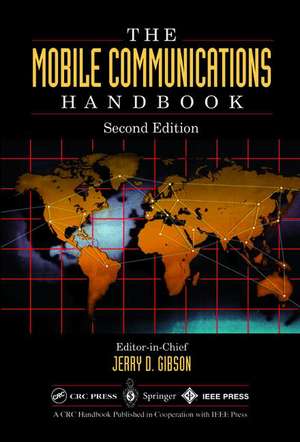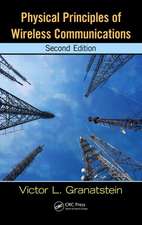The Mobile Communications Handbook: Electrical Engineering Handbook
Editat de Jerry D. Gibsonen Limba Engleză Hardback – apr 1999
| Toate formatele și edițiile | Preț | Express |
|---|---|---|
| Paperback (1) | 589.89 lei 43-57 zile | |
| CRC Press – 29 mar 2017 | 589.89 lei 43-57 zile | |
| Hardback (2) | 1252.76 lei 43-57 zile | |
| Springer Berlin, Heidelberg – apr 1999 | 1252.76 lei 43-57 zile | |
| CRC Press – 21 aug 2012 | 1653.27 lei 43-57 zile |
Preț: 1252.76 lei
Preț vechi: 1527.75 lei
-18% Nou
Puncte Express: 1879
Preț estimativ în valută:
239.71€ • 250.95$ • 198.35£
239.71€ • 250.95$ • 198.35£
Carte tipărită la comandă
Livrare economică 07-21 aprilie
Preluare comenzi: 021 569.72.76
Specificații
ISBN-13: 9783540648369
ISBN-10: 3540648364
Pagini: 720
Ilustrații: XII, 703 p.
Dimensiuni: 178 x 254 x 44 mm
Greutate: 1.45 kg
Ediția:2nd ed. 1999
Editura: Springer Berlin, Heidelberg
Colecția Springer
Seria Electrical Engineering Handbook
Locul publicării:Berlin, Heidelberg, Germany
ISBN-10: 3540648364
Pagini: 720
Ilustrații: XII, 703 p.
Dimensiuni: 178 x 254 x 44 mm
Greutate: 1.45 kg
Ediția:2nd ed. 1999
Editura: Springer Berlin, Heidelberg
Colecția Springer
Seria Electrical Engineering Handbook
Locul publicării:Berlin, Heidelberg, Germany
Public țintă
Professional/practitionerCuprins
Basic Principles: Complex Envelope Representations for Modulated Signals. Sampling. Pulse Code Modulation. Baseband Signaling and Pulse Shaping. Equalization. Line Coding. Echo Cancellation. Pseudonoise Sequences. Optimum Receivers. Forward Error Correction Coding. Spread Spectrum. Diversity Techniques. Digital Communication System Performance. Standards Setting Bodies.- Wireless: Overview. Modulation Methods. Access Methods. Fading Channels. Statistical Distributions of the Fading Signal. Space-Time Processing. Location Strategies for Personal Communication Services. Analysis of IS-41 C Authentication Protocols for PCs. Cell Design Principles. Microcellular Radio Communications. Fixed and Dynamic Channel Assignment. Radio Location Techniques. Power Control. Enhancements in Second Generation Systems. Pan- European Cellular Standard. IS-54 North American Cellular Standard. British Cordless Telephone Standard. RACE Programs. Half-Rate Standards. Wireless Video Standards. Fixed and Dynamic Channel Assignment. Wireless LANS. Wireless Data. Wireless ATM. Wireless ATM 2. Third Generation Systems.
Caracteristici
Includes approximately 70% new, revised, or updated information from the first edition Introduces the basic principles of analog and digital communications Provides background information and technical details Covers such topics as cellular mobile radio, personal communication systems, user location and addressing, wireless data, wireless LANs, and technology standards Assesses future directions Contains independent contributions, but with intentional overlap between articles, providing essentially self-contained articles that can be read in whichever order desired by the reader
Notă biografică
Jerry D. Gibson is a professor and the department chair of electrical and computer engineering at the University of California, Santa Barbara. Author, co-author, and editor of numerous books, Dr. Gibson was associate editor for speech processing for the IEEE Transactions on Communications from 1981 to 1985 and an associate editor for communications for the IEEE Transactions on Information Theory from 1988 to 1991. He was president of the IEEE Information Theory Society in 1996 and served on the Board of Governors of the IT Society for 10 years. He was a member of the Speech Technical Committee of the IEEE Signal Processing Society from 1992 to 1994. Dr. Gibson served as technical program chair and founder of the 1999 IEEE Wireless Communications and Networking Conference, technical program chair of the 1997 Asilomar Conference on Signals, Systems, and Computers, and general co-chair of the 1993 IEEE International Symposium on Information Theory. He was an elected Member-at-Large on the Communications Society Board of Governors from 2005 to 2007. Currently, he serves on the Steering Committee for the Wireless Communications and Networking Conference. He was an IEEE Communications Society Distinguished Lecturer for 2007–2008, and he is a member of the IEEE Awards Committee and the IEEE Medal of Honor Committee. Dr. Gibson also received the IEEE Technical Committee on Wireless Communications Recognition Award in 2009 for contributions in the area of Wireless Communications Systems and Networks.
Recenzii
"The Mobile Communications Handbook is the most comprehensive overview of the key concepts and techniques underpinning modern wireless communication systems. The chapters are written by leading experts in the corresponding area. There is no other reference book like it available."
—Jeffrey G. Andrews, The University of Texas at Austin, USA
—Jeffrey G. Andrews, The University of Texas at Austin, USA
Descriere
Descriere de la o altă ediție sau format:
This third edition reflects the latest advances in mobile communications. In particular, the text expands coverage of wireless local area networks, low-speed wireless data, and wireless ATM. The book also addresses new standards for wireless LANs and high-speed broadband, as well as for wireless mesh networks, mobile ad hoc networks, and tandem connections of digital cellular, IEEE 802.11, and IEEE 8902.16 networks. The author also covers the development of very-short-distance wireless connectivity technologies, such as Bluetooth and ultrawideband technologies, along with the rise of third- and fourth-generation digital cellular systems and wireless multimedia communications.
This third edition reflects the latest advances in mobile communications. In particular, the text expands coverage of wireless local area networks, low-speed wireless data, and wireless ATM. The book also addresses new standards for wireless LANs and high-speed broadband, as well as for wireless mesh networks, mobile ad hoc networks, and tandem connections of digital cellular, IEEE 802.11, and IEEE 8902.16 networks. The author also covers the development of very-short-distance wireless connectivity technologies, such as Bluetooth and ultrawideband technologies, along with the rise of third- and fourth-generation digital cellular systems and wireless multimedia communications.









